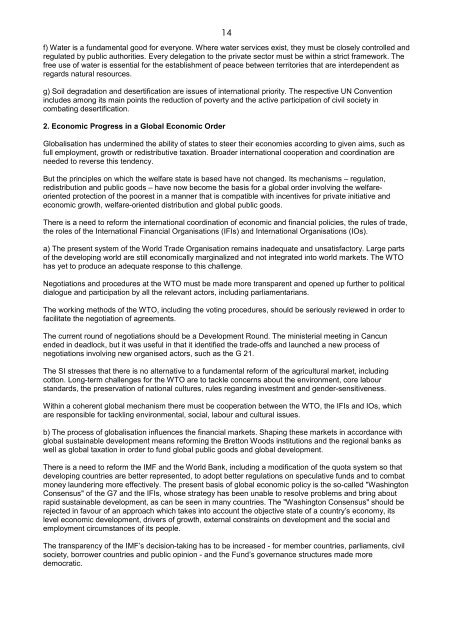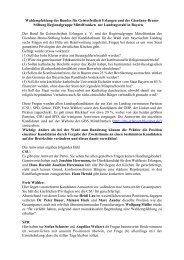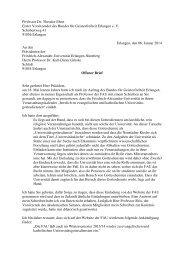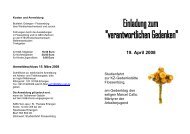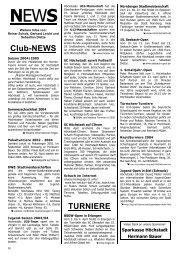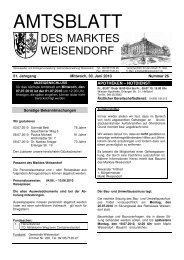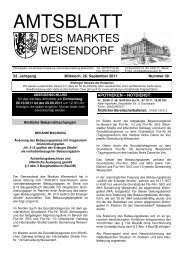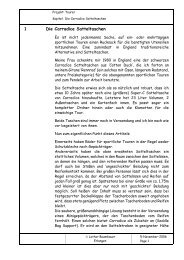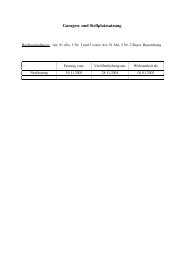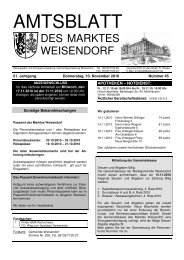Globalisierung - Realität und Ideologie.pdf - FEN
Globalisierung - Realität und Ideologie.pdf - FEN
Globalisierung - Realität und Ideologie.pdf - FEN
Erfolgreiche ePaper selbst erstellen
Machen Sie aus Ihren PDF Publikationen ein blätterbares Flipbook mit unserer einzigartigen Google optimierten e-Paper Software.
14<br />
f) Water is a f<strong>und</strong>amental good for everyone. Where water services exist, they must be closely controlled and<br />
regulated by public authorities. Every delegation to the private sector must be within a strict framework. The<br />
free use of water is essential for the establishment of peace between territories that are interdependent as<br />
regards natural resources.<br />
g) Soil degradation and desertification are issues of international priority. The respective UN Convention<br />
includes among its main points the reduction of poverty and the active participation of civil society in<br />
combating desertification.<br />
2. Economic Progress in a Global Economic Order<br />
Globalisation has <strong>und</strong>ermined the ability of states to steer their economies according to given aims, such as<br />
full employment, growth or redistributive taxation. Broader international cooperation and coordination are<br />
needed to reverse this tendency.<br />
But the principles on which the welfare state is based have not changed. Its mechanisms – regulation,<br />
redistribution and public goods – have now become the basis for a global order involving the welfareoriented<br />
protection of the poorest in a manner that is compatible with incentives for private initiative and<br />
economic growth, welfare-oriented distribution and global public goods.<br />
There is a need to reform the international coordination of economic and financial policies, the rules of trade,<br />
the roles of the International Financial Organisations (IFIs) and International Organisations (IOs).<br />
a) The present system of the World Trade Organisation remains inadequate and unsatisfactory. Large parts<br />
of the developing world are still economically marginalized and not integrated into world markets. The WTO<br />
has yet to produce an adequate response to this challenge.<br />
Negotiations and procedures at the WTO must be made more transparent and opened up further to political<br />
dialogue and participation by all the relevant actors, including parliamentarians.<br />
The working methods of the WTO, including the voting procedures, should be seriously reviewed in order to<br />
facilitate the negotiation of agreements.<br />
The current ro<strong>und</strong> of negotiations should be a Development Ro<strong>und</strong>. The ministerial meeting in Cancun<br />
ended in deadlock, but it was useful in that it identified the trade-offs and launched a new process of<br />
negotiations involving new organised actors, such as the G 21.<br />
The SI stresses that there is no alternative to a f<strong>und</strong>amental reform of the agricultural market, including<br />
cotton. Long-term challenges for the WTO are to tackle concerns about the environment, core labour<br />
standards, the preservation of national cultures, rules regarding investment and gender-sensitiveness.<br />
Within a coherent global mechanism there must be cooperation between the WTO, the IFIs and IOs, which<br />
are responsible for tackling environmental, social, labour and cultural issues.<br />
b) The process of globalisation influences the financial markets. Shaping these markets in accordance with<br />
global sustainable development means reforming the Bretton Woods institutions and the regional banks as<br />
well as global taxation in order to f<strong>und</strong> global public goods and global development.<br />
There is a need to reform the IMF and the World Bank, including a modification of the quota system so that<br />
developing countries are better represented, to adopt better regulations on speculative f<strong>und</strong>s and to combat<br />
money la<strong>und</strong>ering more effectively. The present basis of global economic policy is the so-called "Washington<br />
Consensus" of the G7 and the IFIs, whose strategy has been unable to resolve problems and bring about<br />
rapid sustainable development, as can be seen in many countries. The "Washington Consensus" should be<br />
rejected in favour of an approach which takes into account the objective state of a country’s economy, its<br />
level economic development, drivers of growth, external constraints on development and the social and<br />
employment circumstances of its people.<br />
The transparency of the IMF’s decision-taking has to be increased - for member countries, parliaments, civil<br />
society, borrower countries and public opinion - and the F<strong>und</strong>’s governance structures made more<br />
democratic.


